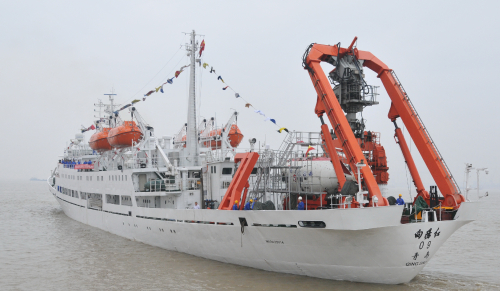|
 |
|
BON VOYAGE: China's deep-diving manned submersible Jiaolong, inside its carrier Xiangyanghong-9, leaves Jiangyin Port in east China's coastal Jiangsu Province on November 25 on its maiden scientific expedition to the southwest Indian Ocean. (ZHANG XUDONG) |
Free Visit
The Palace Museum in Beijing will waive the entry fee for certain residents, it announced on November 24.
Chinese teachers, students, soldiers, police, medical staff and volunteers will be able to visit the museum for free on the first Wednesday of each month from December 2014 to April 2015.
The initiative aims to foster interest from these key groups of society in the popular ancient Chinese palace during the museum's quieter months, while at the same time reducing the hordes of tourists during high season.
Those eligible must make reservation online 10 days before their visit. Adult tickets for the museum cost about 60 yuan ($9.78).
Underground Water
Beijing will gradually shut down 6,900 urban wells in the next five years to protect groundwater and improve drinking water quality.
Aging of facilities and poor management mean that the quality of water from wells cannot be guaranteed in some areas, resulting in a steady stream of complaints from citizens, said Zhang Ping, deputy head of the Beijing water authority.
The middle route of the gigantic south-to-north water diversion project will soon come on stream, bringing 1 billion cubic meters to Beijing each year from a reservoir on the Hanjiang River, which may lead to possible closure of the wells.
Since 1999, Beijing has used too much groundwater—about 6.5 billion cubic meters too much. Long-term overexploitation has led to environmental problems like subsidence. The water table in parts of Beijing has dropped 12.8 meters since 1998, and more than 1,300 square km of land has subsided over 50 centimeters.
Football Training
China's education minister Yuan Guiren said on November 26 that football will be factored in when forming a comprehensive quality assessment of students, adding that schools will keep a record on students' football skills.
Addressing a national conference on promoting football in schools, Yuan said the ministry will inspect schools' efforts on football education.
Football will also become a compulsory part of physical education classes to provide more chances for students to play football, said Yuan.
The ministry will also help set up more football academies. The goal is to have about 20,000 primary and middle schools that focus on the promotion of football by 2017, said the minister.
The ministry also plans to train as many as 6,000 football teachers in 2015. | 